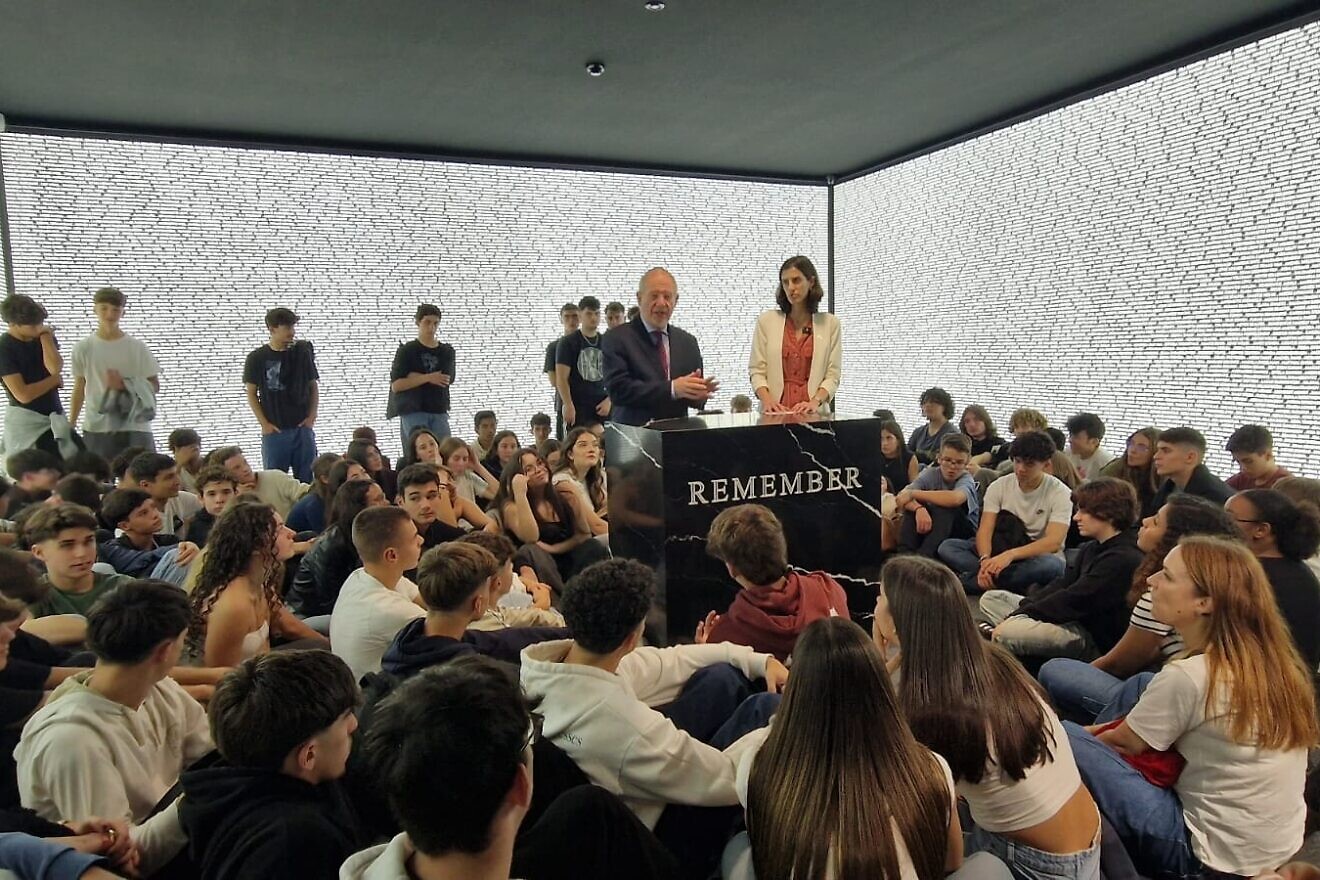The Oporto Jewish community in Portugal, one of the strongest in Europe, commemorated the anniversary of Kristallnacht at its Holocaust Museum on Nov. 7.
Kristallnacht, or the Night of Broken Glass, marks the night of Nov. 9, 1938, when Jews were attacked in a pogrom across territories controlled by Nazi Germany. Hundreds of Jews were killed and more than 7,000 Jewish businesses and 267 synagogues were smashed and burned. Thirty thousand Jewish men were sent to concentration camps, in the opening salvo of what would become the Holocaust.
Some 2,500 teenagers from schools across Portugal attended the commemoration, which was sponsored by the British embassy in Portugal, which covered the costs of bringing the youngsters to the museum.
A memorial flame was lit.
The commemoration took place in the shadow of the Amsterdam pogrom, when Muslims attacked Israeli soccer fans, injuring several.
“As we commemorate Kristallnacht, we are reminded that it is not just part of history but is happening in parts of Europe today, where Jews are being hunted and assaulted at this very moment,” said Oporto Jewish community President Gabriel Senderowicz.
“This can be confronted in many ways, but one of them is educating the next generation to understand how hate and ignorance can lead to violence and destruction. This is why we are focused on bringing tens of thousands of young Portuguese students to our Holocaust Museum. This should be replicated around Europe, that is how we combat antisemitism,” Senderowicz said.
Holocaust Museum of Porto Director Michael Rothwell and British Ambassador to Portugal Lisa Bandari presided over the ceremony.
Rothwell spoke to the crowd about his grandparents’ experience of having their shop windows smashed during the pogrom in 1938.
“For my grandparents, the vandalism of their shop and throughout Berlin was the turning point at which they realized the family had to leave Germany,” he said.
“Their children escaped to England thanks to the Kindertransport, but they themselves ended up being taken by train to Auschwitz-Birkenau, the largest of the German Nazi extermination camps, where they were both murdered in 1943,” Rothwell said.
Bandari expressed admiration for the museum and the “inspiring work” of Rothwell and his colleagues.
“This museum teaches us about the dark places humanity can go when instead of pursuing tolerance, we allow disinformation and the dehumanization of minorities,” she said. “This is a central theme: How we can all work together to learn more and tackle disinformation and hatred, especially when it is aimed at minorities for whom we must all speak up, even at difficult times.”
Boundless hatred
Also present were Israeli Ambassador to Portugal Oren Rozenblat, who spoke, and the vice president of the Porto Municipality, Filipe Araújo.
“Kristallnacht, that dark night between November 9 and 10, 1938, is a painful reminder of the fragility of justice and the strength of boundless hatred. This violent antisemitic massacre, engulfed by the silence and disregard of the ‘common man,’ was one of the key events preceding and foreshadowing the Holocaust,” said Rozenblat.
He noted that the “key difference” today is that there is a strong, independent State of Israel, capable of defending itself.
The Holocaust Museum of Porto is the only one dedicated to the Shoah on the Iberian Peninsula. It is run by members of the local community whose family members were murdered during the Holocaust.
Approximately 50,000 schoolchildren and university students visit it each year.
“Our Holocaust Museum plays a singular role in Portugal. I do not believe there is anything of such magnitude in Europe, something that has been so broadly welcomed by schools,” said David Garrett, a leading member of the Oporto Jewish community.
“The museum opened four years ago and has already received nearly 20% of the country’s teenage population,” he said.
Garrett lamented the state of Holocaust education. “The school programs are a misery and Holocaust museums are usually in the hands of states, municipalities and non-Jewish organizations, and they only preach messages of human solidarity, never about the long, centuries-old persecution of the Jews,” he said.
Schools treat the Shoah as an assault on minorities and the result of a generalized intolerance and xenophobia. “Even the word ‘Jew’ is hardly mentioned in political speeches about the Holocaust,” he said. “It is already missing in some speeches.
“Our museum teaches history as it really was and does not isolate the Holocaust as if it had occurred in a vacuum. Rather it treats it as the maximum exponent of what happened to the Jews for two millennia. This is the big picture,” Garrett said.

























